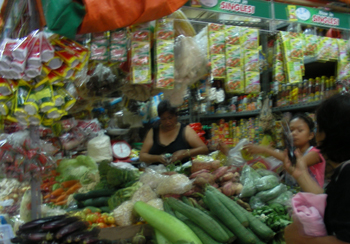With their small parcels of land no longer producing enough for their families, peasant women and men try to make do with odd jobs.
By LYN V. RAMO
Bulatlat.com
RIZAL PROVINCE — To Nanay Ceding, 62, a mother of eight, and her neighbors in a suburban peasant village, coping up with extreme poverty and the erratic climate meant leaving the family and the farms for at least six hours every day.
Nanay Ceding is a woman peasant of Rizal province, near Metro Manila. Her husband, Carding, was also a farmer, but since his death in 1999, Nanay Ceding had to care and provide for the family alone. She also provides for her eldest son who has married and has a growing family of four. (Nanay Ceding that her full name as well as that of her family members be withheld.)
They came from Aklan in the early ’70s to look for greener pastures in Manila but were forced to settle in Rizal for lack of qualifications to land a decent job in the city. Some of her neighbors are Ilonggos, who had settled earlier in a piece of land entrusted to their uncle who came from Iloilo in 1950. He is now 94 years old.
Like many other peasant women in her neighborhood, Nanay Ceding has to go out of the village to do household chores for middle-income families, mostly professionals and businessmen, government employees and office workers who find it hard to do the laundry and housekeeping while they work the whole day.
Nanay Ceding said she goes home after work at around 1:00 p.m.
“My children are waiting,” she said during an interview. Waiting means they have not cooked anything for lunch. Nanay Ceding brings home whatever they needed in the next 24 hours. “We have to make do with the meager earnings,” she said.
Nanay Ceding earns between P200 to P500 ($4.33 to $10.83) a day, depending on the type of work and the number of hours spent.
The women who have to take on the traditional breadwinner role of men leave their yet sleeping babies to older children. Work begins with cooking breakfast for the families they work for in Quezon City, Marikina, Pasig, or Manila. It ends around lunchtime after gathering the laundry and hanging it inside the house to allow it to dry.

Peasant women, like Nanay Beng (shown in the picture tending to her vegetable store), are forced to find odd jobs. (Photo by Lyn V. Ramo / bulatlat.com)
Some of them sell vegetables and fruits in the cities. They also leave early to catch prospective buyers before lunchtime. Their merchandise come from either their own vegetable patches or from neighbors. Others get vegetables on concession basis from traders in the city.
Planting No Longer Sustainable
The men in the village have not stopped planting despite the degradation of the soil quality in the mountain slopes. They still use and maximize the remaining land to plant various vegetables and root crops to augment the family income. In the past several decades, landlessness, in the form of either not owning the land they till or the lack of land to till, has been causing untold miseries for peasants who make up the bulk of the Philippine population.
The changing climate has taken yet another toll on them, on top of the conditions that have traditionally pushed them into deep poverty in the metropolis.
Peasants in Rizal towns like Rodriguez depend on the rains to plant rice. Because they plant on clearings on mountain slopes, they act according to the natural occurrence of sun, wind and rain. In June, when the rains start to pour, some of them prepare the slopes and sow their last seedlings on holes through direct planting. Because the rains did not pour as expected in June, their seedlings did not grow. There are no more seeds to sow in the rainy season, Nanay Ceding lamented.
“The men have to resort to producing charcoal,” she said, but there are no more dead trees and even the live ones are getting scarce so charcoal is a dying industry.
Taking on Different Kinds of Jobs
Nieves Sarcos, called Nanay Beng by friends and neighbors, 58, said many women have taken the initiative to go out of their houses to do house chores for other people while some of the men try to find odd jobs to do.
“These peasant women have skills both in the home and the farms,” said Nanay Beng, who also serves as national council member of Amihan, the national federation of Filipino peasant women.
The women now earn around P6,000 ($129.95) a month while their husbands take home only some P1,800 ($38.98) every two weeks as construction workers. They come home only twice a month so the woman’s daily income saves the family from starving.




